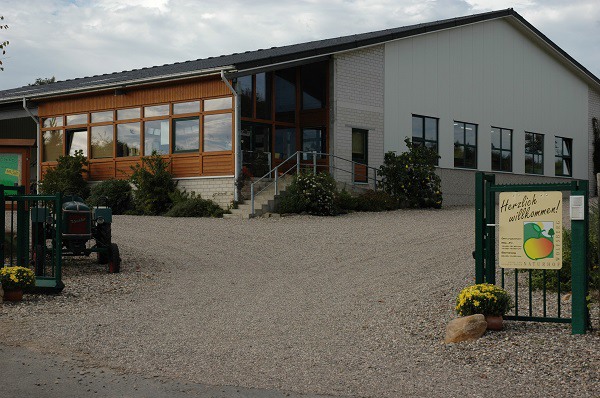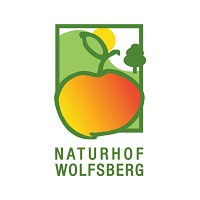At the start of the new apple harvest in the North Rhine region, we spoke with Dr. Andreas Mager, managing director of Naturhof Wolfsberg as well as a board member of the Fördergemeinschaft Ökologischer Obstbau e.V. (FÖKO). "In direct marketing this year, we were able to reach approximately the level of 2021, i.e. the second Corona year, with the alternative produce. In turn, the war in Ukraine led to a total collapse in demand in 2022. Price sensitivity can be heard in many places, although there are also regional differences. Our customers from the Bonn region in particular are not exactly poverty-stricken."

Harvest start of the autumn varieties
Recently, Naturhof Wolfsberg started harvesting the first autumn varieties, starting with Santana, followed by Elstar and Freya. After that, the varieties Gala, Topaz, Boskoop and Berlepsch, as well as Pinova, Natyra and Braeburn come to harvest. "Natyra trades in the conventional sector as Magic Star, which in turn is marketed as a club variety. Natyra itself is a free variety, but its name may only be used in organic cultivation. On our 30 hectares, we primarily grow the varieties Elstar, Gala, Topaz, Pinova as well as Natyra. In parallel, we are also picking the first pears of the Conference variety, followed by Alexander Lucas, as well as the new red variety Fred and Talgar Beauty."
The farm's products are sold to food retailers through its own farm store as well as through Rheinbiofrucht Ltd. "With 30 hectares, one was still a large farm in earlier times. Nowadays, with such an area, you are more likely to be among the medium-sized farms. We try to improve continuously, but we are not interested in increasing the area. In general, however, it can be said that the trend is towards larger farms, while smaller farms are disappearing. The resulting lack of volume is in turn compensated for by the large farms."
Poland acts more "price-aggressively
On a field trip to Poland with FÖKO, Mager was able to observe how the organic sector is becoming increasingly professionalized in the neighboring country. "In Poland itself, hardly any organic produce is consumed, so there is practically no market for the product in their own country and they have to export their organic apples accordingly. The main export countries for Polish produce include Scandinavia and parts of Great Britain. For classic export countries such as South Tyrol, France and Austria, this poses a real problem," Mager says. "Poland is becoming more aggressive on prices - in Germany as well. The pressure generated by Poland in terms of price is also reflected in our food retailing. South Tyrol is also offering its goods at lower prices with us in order to compete with Poland. However, German retailers remain very loyal to German regional goods."
Higher costs due to weather, wages, crop protection
The weather changes, especially the drought, are definitely challenging, he said. "The higher temperatures also increase the potential for invasive species, such as the marmorated tree bug or even the red-legged tree bug, some of which we can't control," he said. In the spring, soil frost again plagues us. Farms that can afford it financially therefore invest massively in sprinkler systems, hail nets, sun protection, etc. This also makes the produce correspondingly more expensive. This also makes the product correspondingly more expensive."
Apart from that, a major structural change can be seen in Germany, he said. "Smaller farms are going out of business because they can't find successors. At the same time, however, professionalization in the organic sector is steadily advancing. In the past, people used to take over neighboring farms, but that will no longer be possible in the future because the costs are immeasurably high. Accordingly, the organic farm of the future will have to find a balance between biodiversity, ecology and professionalism," says Mager. "Family farms can be found less and less, as the amount of work is almost impossible to handle, which is true for both conventional and organic farms. Instead, it's the already large farms and chains that remain successful."
As a training company, Mager's farm trains an average of one to two apprentices per year, who spend two to three years at the Naturhof. "However, most of them do not stay in the industry and take the apprenticeship as a stepping stone for a bachelor's degree. That's why we now only accept apprentices who are either extremely practical or have a perspective in our profession," says Mager. Further, he says, investing in apprentices costs significantly more than paying seasonal workers, for example.
"Had it not been for the war, the organic industry would be in a much better position. Our production costs have risen by about 15 percent within a year due to the increased minimum wage as well as other costs. In retail, prices have gone up three percent, but they've gone down 20 percent for us." Despite all these challenges, Mager is optimistic about the future. "We've already set a lot of targets for the future and we're aware of what we're capable of."
For more information:
Dr. Andrea Mager
Naturhof Wolfsberg
Ökologischer Obstanbau
Mager GbR
In der Asbach 44
53347 Alfter
Tel.: 0228-643947
E-mail: [email protected]
Website: https://www.naturhof-wolfsberg.de
